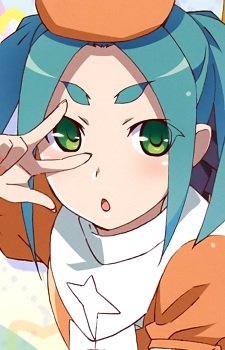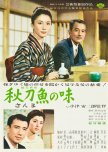
Marry your daughter quickly, time may run out!
An Autumn Afternoon (1962) was Ozu's final film. It can be watched as a stand-alone or first Ozu film, but it will be more enjoyable to have seen many of Ozu's predecessor films.Ozu made so many films with seasonal themes he had to subdivide films not only by season but by time of day. Had he lived longer, we may have had an Autumn evening, an Autumn morning, etc. (I'm being playful). Yet again, we have variations on a theme by Ozu. If you've seen Ozu films and are turned off by the covering of similar plots, characters, character names, please reconsider. Amidst the similarities, there is still more ground for us to cover. Even the topic of arranged marriage, despite being presented in at least ten Ozu films, has something new for us to consider each film. We might feel rather certain that we're completely against such an antiquated practice only to wonder if it might end up being okay, for some folks, or in general. Perhaps it wouldn't suit us, we think, but then we live in a world where many marriages by choice don't work out.
There is nothing particularly new or novel with this film's plot. The increasing westernization of Japan is apparent in this film. Global products like Canada Dry can be seen. Japanese customers appear to have difficulty focusing on their meals at restaurants while taking in the local baseball game by television. Golf clubs are no longer a niche item; they now have a mature used-sale market. Refrigerators are upgraded so often that neighbors warn fellow neighbors 'Don't be in such a rush to buy a fridge; a better one will soon be on its way'.
The characters are familiar for those having experienced other Ozu films. Yet, the characters are quite enjoyable here. Chishu Ryu plays what I consider to be one of his more complex characters. He's yet again a father, widowed, and trying to set his daughter up with a marriage, but the variation here as well as subtle differences in his character are fully distinct enough to generate both new reflection and enjoyment. It's as if we've had chocolate chip cookies, then Ozu splashes in a hint of mango with the new variation. They're still chocolate cookies, but we consider what we're eating with newfound perception. Chishu is still SO familiar to his other roles that we feel his character is rather an extension or an accumulation of all prior 'fatherly' roles, but again, there's something new here in the character and acting to digest. He certainly enjoyed drinking in this film!
Okada Mariko and Sada Keiji play their roles in their 2nd consecutive Ozu film (the prior one being End of Summer) rather well. The support characters in An Autumn Afternoon are not as well-developed or convincing compared to End of Summer, but there are a few standouts. Shima Iwashita plays a background role in Late Autumn, but her entry into a starring role in an ozu film gifts us with a srong performance. She carries on the Ozu 'Noriko' spirit quite well as the daughter who won't say what they want and tirelessly take care of their father and family. The character, the "Gourd", wasn't particularly convincing, but a way to comment on what the 'father' figure would turn out to be if they didn't successfully marry off their 'daughter'. In most Ozu films, we see that the 'father' is successful in marrying off their daughters. The "Gourd" also is a tool to comment on social economic differences, and especially the awkwardness when juniors/students end up far more successful than the seniors/masters (Sensei).
Ozu gives us another one of his great ellipses/gaps in An Autumn Afternoon. After showing us the face of a potential groom, he doesn't satiate our curiosity with an image of the actual groom. We only see the bride and her immediate family.
Gender roles in society and family are well-explored in this film. And it is a bit more forward in examining WWII themes or themes of the 'soldier'. While not Ozu's best film, it was certainly a solid last film in the oeuvre.
Was this review helpful to you?
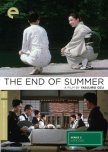
"I'm happy as I am"
Ozu's 2nd to last film, The End of Summer, starts off with a sign of changing times. We see neon lights in the nightlife of a city (Osaka it seems). One of the earliest scenes is in a posh cocktail bar. Despite these signs of 'modern' times at the time of the film (1961), Ozu brings us back to much of the classic or traditional cues his stories are primarily based in. The film takes place in classic looking towns with traditional style homes and clothing.With the End of Summer, we are treated to variations of Ozu themes yet again. Setsuko Hara plays the lead in Akiko, which was also the name of her character in the previous Ozu film, Late Autumn, but it is a different Akiko. There's another character in End of Summer, named Noriko, but it is not played by Setsuko. Ozu must have had a blast with vanilla characters and repeated names. It's as if he was saying it doesn't matter who the character is - their name, their role, their relationship - because what he wanted us to see was the common denominator of all these characters - the humanness.
Ozu films have this interesting juxtaposition of similar characters, plots (family themes), and storytelling mechanics. But the setting changes as the times change. It doesn't matter if we start off with silent films, then move on to black and white, then to color, or that it is pre-WWII or post WWII, or whatever else has changed in the external world; no, it doesn't matter because being human remains the same regardless of country, era, and place. Did neanderthals keep secrets from one another? I'd wager they did.
The similarity of Setsuko Hara's Ozu roles is not by mistake. She is not a one-note actress. Ozu purposefully keeps her character roles and temperaments limited. Hara's character Akiko, says "I'm happy as I am". It's a summary of all of Setsuko's Ozu characters. It's as if the character/Ozu are saying, "Let me stay this way in a world that is constantly changing; let me hold on to this beautiful moment, savor myself - my life- as it is right now; what more could I ask for in this life?". However, change indeed happens to us all, and keeping that happy moment forever with the accompaniments, companions, and scenes of that moment are impossible.
The music in this film was more experimental and versatile. It opens up with a Baroque music aesthetic. It certainly caught my attention more in this film compared to other Ozu soundtracks. However, some of the music is a bit jarring or doesn't quite fit the ambiance.
This film was solid, but it wasn't as emotionally impactful as other Ozu films. Many of the support roles felt insignificant or less compelling compared to other Ozu film characters. This film, while very visually stimulating, felt a bit tiresome in terms of plot and character development. There wasn't quite enough variation to Setsuko's role in this film and her character came across a bit bland. Still, it is a worthwhile film to watch for the veteran Ozu filmgoer.
Was this review helpful to you?
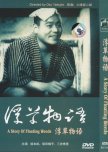
At age 31, Ozu's narrative mastery was already apparent
A Story of Floating Weeds (1934) is a silent black and white film later remade as Floating Weeds in 1959 in audio and color. I first watched Ozu's remake of "A story of Floating Weeds", then viewed the earlier version with a comparative mindset. At the time of the remake, Ozu was age 56. Floating weeds is absolutely masterful, and not surprising given the director-writer's experience and access to wider range of tools (audio, color, etc.). The precursor film, A story of Floating Weeds, is very similar to the remake. Many scenes are virtual copies. The characters, although with different names, are essentially the same.For the average movie goer, especially those without much study or knowledge on Japan, Floating weeds is by far the more accessible and recommended film. A story of floating weeds is a great watch for those that really wish to view Ozu's oeuvre and study the filmmaker or some aspect of Japanese cinema or Japanese history/society.
In viewing both films, one can sense a difference in the technological tools, the state of filmmaking, and cultural/societal influences. It's interesting, for example, to compare the few scenes of domestic violence. In the 1934 version, the hitting looks 'heavier' but there is no sound. In the 1959 version, the hitting looks 'lighter' but the sound cues make it seem more aggressive. Both viewings are disturbing, nonetheless, but it is interesting to see these scenes present with a similar outcome using different techniques; that consistency of impact demonstrates Ozu's directorial and narrative skill. He obviously knew what outcome he sought in both his 31-yr old and 56-yr old selves and could achieve it with different sets of tools.
It's remarkable that, at age 31, Ozu had a very strong grasp of techniques to achieve narrative vision. That at age 56 he felt the prior 1934 film story, itself, was well-tuned and not needing major changes is truly incredible. It seems one cannot escape the director's urge to display ego in this day and age. We have so many filmmakers who modify original story materials they work with at will, often without any logical or aesthetic advantage, simply because they can, or because they feel impotent; they want others to feel their creative stamp even more than making great film. Peter Jackson and the Lord of the Rings is a great example of that phenomenon, changing Tolkien's sources severely and utterly changing the nature of characters, plot lines, and often not for the better. If one changes something, they should improve it; if they don't improve they either have a poor ego issue or are simply not good at assessing the quality of their craft. Again, it shows great maturity and confidence that Ozu understood what made a quality narrative and there was no need to try to one-up the prequel or even himself in the remake. Great pasta is simple; do we need to inject it with novel flavors custom mixed by a pasta bartender? Are we afraid our customers will get tired of the great pasta we made to begin with?
Compared to the 1959 version, the characters of Otoki and Otaka in this film were stunning when presented side by side. I couldn't help but think they were mother and daughter. They were visually hypnotic together.
The music accompaniment - or rather the 90 minute Piano sonata - was okay. I don't know enough about accompaniments to silent films to judge confidently, but I would be intrigued to hear something else, especially something more 'Japanese'.
The 1934 version, in a comparative side by side viewing to the 1959 version, feels less full and perhaps more rushed. It works with 30 less minutes of film time. Although the plot came through just fine in the 1934 film , the 1959 version allows viewers to savor the characters and emotions more satisfactorily. Nevertheless, the Story of Floating Weeds was impactful and certainly worth a watch for the more eager Ozu viewers.
Was this review helpful to you?
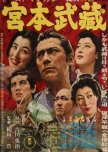
Below average plot/characters; terrific ambience and cinematography
What an interesting film trilogy to review. In fact, I feel it is easier to regard this as one film with three parts, separately released. Consider this as one cumulative review for Samurai I, II, and III (I won't provide any plot spoilers).The story takes place in the 17th century Japan. It is after the Battle of Sekigahara. Our titular character, Mushashi, leaves the small village life seeking fame as a warrior. Musashi eventually becomes a ronin, a wandering samurai, and we accompany this character on his adventures. The plot is fictional, but the character of Musashi Miyamoto is a true historical figure.
First off, I will say that I enjoyed this film, have seen it twice, and look forward to a rewatch down the road. However, it is a subpar film in terms of plot, character, acting, and music. Plot is especially laughable. The action scenes, in particular, are uninspiring and lacking. Characters present as unbelievable, one-dimensional, and some even as pathetic. Even for Toshiro Mifune, a titan in film, this is not one of his stronger performances. The only music I can recall is one heroic sounding theme that is repackaged over and over throughout the film. The dialogue, as well, is unremarkable.
The two female leads, Otsu and Akemi, are strangely compelling despite narrow character design (and even mediocre acting); compelling as in I found myself rooting for both characters. In many films portraying historical women in Japan, say in the role of geisha or romantic intrigue, I find these characters to be flat. Perhaps the presentation of Otsu and Akemi as outgoing and forward was a refreshment and something to look forward to on some level.
So, why did I enjoy this sub-par film and why would I rewatch it again?
Ambience. I suspect the film has many historical inaccuracies, but I could grasp a distinct and coherent ambience not easily felt in other period films. If you've seen many historical asian dramas, especially K-drama or C-drama, it is as if all of the historical eras over a millennia are presented in the same visual way - same court costumes, hats, sets, gardens, castles, etc. It gets tiresome seeing the same 'historical image' over and over. With the Samurai Trilogy, the film looked and felt as if it might be more like the 1600s rather than 1800s. Even though the film plot and aesthetics are fictional, the coherent ambience helped suspend my belief; I could believe I was watching people in 1600s Japan.
The natural scenery in this film was prominent and alive. Mountains, rivers, trees, rice fields, grassy meadows, etc., all looked full and wonderful. It was like being enclosed in the romantic nature and space of 17th century Japan. And for that feeling alone, I would venture back to watch this film from time to time without taking the film craft aspect too seriously.
Was this review helpful to you?
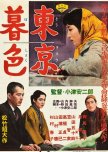
Quality relationships are the biggest impact on happiness
Tokyo Twilight (1957) was Ozu's last film in black and white. It is a family drama and is regarded as one of Ozu's darkest films. This is a film worth watching if you've already seen a few Ozu films and want to be 'completist' in your Ozu viewing. Otherwise, as a stand alone film selection, I don't recommend it for most folks.Considering the seasonal themes of many Ozu films, Tokyo Twilight features snow, so we are firmly in the season of Winter.
The issue for me, isn't so much the dark themes and plot outcomes, but rather having difficulty accepting Akiko - the distraught daughter who seems to have no luck in life. In some ways, I felt the character's presentation wasn't believable and, as a result, had difficulty empathizing with this character. The two Ozu films that I've seen the actress, Arima Ineko, star in, I was irritated with her characters including Akiko. Ms. Arima's characters present overwhelmingly as stubborn, impatient, and lacking in social skill and regard for others. Perhaps that was intended by Ozu, or perhaps, it was overacted to some extent. In any event, the filmgoer is supposed to feel for Akiko, who has no close relationships to lean on for true support.
Setsuko Hara, on the other hand, plays the depressed older sister role of Takako. She was terrific to watch in this film, and I gained a greater appreciation of her skills after being accustomed to her bubbly, smiling, 'pure' daughter roles in other Ozu films. The subtle sorrow that Ms. Hara projects in Tokyo Twilight is convincing and masterful.
Ozu films can, as an overall style or scheme, be not too explicit about plot. There are ellipses or gaps in the plot. This leaves some of the story plot or character feelings open to interpretation. For many Ozu films, this works well; viewers intuit characters' thoughts and feelings because they're so real and relatable that we don't need image or word to confirm what's going on. However, in Tokyo Twilight, these gaps in plot are more confusing, on average, than other films. It might take some 'studying' after watching the film to come to a full understanding of the plot and themes. I suspect many viewers are not willing to do that, which is why I, again, only recommend this film for the Ozu 'completist'.
Was this review helpful to you?
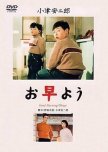
Ozu's most accessible film; a great first film to start with
Yasujiro Ozu, along with his writing buddy, Kogo Noda, collaborated on 27 films. Ozu, alone, made 53 feature films. Good Morning was Ozu's 49th film, and 2nd film in color. This is one of his 'later' films.Good Morning (1959) is easily one of the most accessible films for the new Ozu filmgoer. It is in audio, color, and, at 94 min. run time, very digestible. Compared to other Ozu films, it feels less 'heavy', quicker in pace, and is visually stimulating; older Ozu films (especially the black and white films) have a more static visual presentation. There's lots of explicit and implicit comedy in Good Morning, and the music is more 'modern' compared to earlier films. Furthermore, Good Morning leans heavily on the performance of children, including a cute young child who does an incredible acting job. There's something to like in this film for everyone. This is a fine film to watch for a family with children.
As with all Ozu films, this is a family drama. The plot and themes cover the dynamics of an upper middle class household (father, mother and their two young sons). The film also explores the dynamics of neighborhood relations and intergenerational dynamics. The challenges of raising children are explored as are the differences in socioeconomic statuses of neighbors. Compared to many other Ozu films, which focus on adult characters, Good Morning features well-developed children characters. The children actors in this film, in fact, steal the show.
The portrayal of happy-go-lucky children in Good morning, may be a symbolic decision. In 1959, Japan would have had young children (age 1-15) with little to no living memory of WWII. Instead, the children of Good Morning are concerned with television, watching sumo and baseball, and having fun with friends. The adult parents, conversely, are consumed with work and rebuilding the nation from its WWII defeat; they seem too busy to be strict with their children for long, giving in to demands for consumer pleasures.
While this film may not be as 'emotional' or as 'deep' as other Ozu films, it is still a very thought provoking film. For myself, personally, this film made me want to read more about Japan's modern history.
Good morning is a very good place to start for the first-time Ozu filmgoer and is appropriate for children of middle-school reading ability.
Was this review helpful to you?
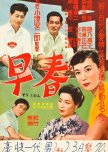
Is Spring muddy everywhere? Are salary workers resigned everywhere?
Seeing the run time at 2hr 24 min, I was concerned this film might not hold my interest or languish in pace. Nothing to fear, the film held my interest all the way through. It's remarkable how Ozu can keep such a low pulse without putting me to sleep. In fact, I am stimulated by his films. Early Spring is no exception and was an excellent representation of Ozu's oeuvre.It seems Ozu covered riskier material in this film compared to earlier ones. The main themes covered were infidelity and the malaise of salary workers. While infidelity was addressed more often and explicitly, I believe the malaise of the salary workers was the deeper undercurrent of the film, despite its implicit narrative. There are common themes that are touched on less frequently or explicitly, such as industrial development, postwar grief, and gender roles in society (i.e. the rapid progress of strong, modern young women).
Sugi and Masako play their roles very well. The scene where Masako confronts Sugi on his transgression is quietly intense. Not even yelling or the breaking of plates could have amplified that intensity. It's difficult to tell what drives their broken relationship. Is it the death and grief of their child? Is it something problematic interpersonally with no external factors mediating the relationship issues? The filmmakers' ambiguity forces us to insert a personal interpretation to explain their circumstances.
Goldfish is less believable as a character, but so distinct and lively that I could not help but enjoy her performance. She symbolizes the salary worker's distraction from disillusionment, a chance to forget about the dull pain of repetitive boredom. One of the male coworkers, in a conversation on the suspicions of their colleagues' affair, comments that he disapproves of it, but is also envious. It might not be Goldfish, specifically, that is desired, but rather the excitement that comes with it. Many Salary workers desperately dream of something better beyond their monotony. Even the opportunity to gossip about coworkers fulfills that itch.
The support cast is a menagerie of workers, company workers, pub-restaurant owners scraping by, and so forth. It doesn't really matter what their jobs are; they're the same, just grinding, cooling themselves with hand fans, gossiping, and moving the cogs of society along.
The salary worker's life of drudgery is one I need not describe in detail. In fact, the following exchange from the film (with a few lines removed to streamline the point) says it all:
That's the fate of the salaryman
Only company directors have autos (everyone else crams on trains)
Sometimes I just hate my work
But it's difficult to change
Worse if you have children
Sure you still have your dreams
But a free life....
I'm a salaried man
Consider this selection of script from a 1956 Japanese film. If you're reading this review, chances are you are not Japanese nor are you 80 or 90 years old. Can you identify with those lines? I would guess many of us know intimately what the lifestyle of a salary worker is like. It's remarkable how cyclical and universal human life can be despite distance in culture, geography, and time/eras. Ozu isn't famous only for the fetishist filmmakers. His films are very relevant in this era for the common people. Things have changed on the surface, but the undercurrent of the salaried lifestyle is still going strong.
Was this review helpful to you?
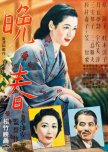
Delicate Spring makes way for powerful Summer
What's remarkable about this film is that it appears completely unremarkable. The pace is slow, there's no action, the characters look lethargic, and the dialogue and cinematography involve us with mundane matters and scenes; the music is painstakingly slow - even a tune we all know well, "Wedding March", is slow and somber; there is virtually no excitement; even the trains move slow. It is remarkable how this film kept me emotionally and intellectually engaged for ~2 hours and prompted ample reflection after the film ended.Since this film is a part of the classic film canon, you can easily look up professional critics' and filmmakers' commentary. Consider that so many have put this film in their top 100 films of all time list; that's not an easy list to make! However, I'll share a few thoughts on how I connected with the film.
Consider the title, "Late Spring". The film was inspired by the short story, "Father and Daughter", by Kazuo Hirotsu. The short story title is directly related to the film's characters and plot; we don't get many explicit clues that the story takes place during Spring, so the film title is more evocative than descriptive. So, why not call the film, "Father and Daughter"? I don't know the reasons the filmmakers chose "Late Spring" as the title, but its suggestion to think about the film metaphorically is quite effective.
Noriko and her father, Somiya, are delicate souls, and their relationship with one another is tender in love to an extreme. After father is told by daughter "no play until work is done", the father's impatient response of "go bring the tea" is the comical peak of his anger (if only tiger parents could study this scene). The impending transition of their relationship status from live-in daughter/dad to no longer living with one another signals a change in their 'season' as a family. Daughter and father were happily living in a delicate Spring. With Noriko's upcoming marriage, they quickly move to Summer.
Consider Spring, as a social metaphor, representing individuals' inner thoughts and desires. Spring is our most intimate selves. Like the ephemeral spring blooms of cherries and irises, our Spring selves bloom beautifully. But Summer comes roaring like a lion. Spring is never long enough for us.
Summer is the metaphor of group-level or societal thoughts, expectations, and values. Summer is powerful, (more) lasting (than Spring), and self-assured. Societal and group structures like work, school, and family ask us to 'grow up' and 'ripen' - be practical, be productive, is what society says to us. It's as if they say "Enjoy your spring blooming self, briefly, but not too long; we need crops to feed our society, so please get to work; we needs kids to keep our species going, so please get married; we know what's best so please do what we say".
Doesn't it always seem like Summer is rushing Spring? And Spring is too kind to overtake Winter?
As I watched this film, I was aware of my 'Spring' thoughts/feelings and 'Summer' thoughts/feelings. In summer mode, I bought what dad eloquently said about the cycles of life, how marriage is part of that, and father and daughter must move on from one another. That's the script of societies, of families, of 'normal' human relationships. In Spring mode, what dad says seems forced, manipulative, inauthentic. What's really wrong with Noriko living unmarried with father for the remainder of her days? It seems almost every character besides Somiya and Noriko are happy with the upcoming marriage, even relieved, as if the father and daughter's relationship was overripe and soon to rot. That's the summer thinking.
Many of the relationships in this film can be viewed, in the spring sense, as pure, intimate, and innocent. But switch to summer thinking/feeling, and those same relationships are now viewed as impure, vulgar, and lacking appropriate distance between expected social roles. Noriko's playful relationship with Mr. Onodera (father's friend), can easily be viewed either way; she's having a playful chat with someone she trusts or there's something inappropriate since their age gap is too great, and Mr. O shouldn't be playful with his friend's daughter since he was recently re-married; they even hang out and shop together without Dad's presence/knowledge -- Oh! The scandal! Our initial response to these scenes speak to what season our minds and hearts are in. If you're still not sure what I mean, consider the famous film by Studio Ghibli/Hayao Miyazaki, "My Neighbor Totoro". There's a scene with the father bathing with his two daughters. I'm certain many people will see this as a beautiful, tender, and loving scene, while others, no doubt, will watch uncomfortably believing this is inappropriate. Spring thinking vs Summer thinking is what I'm getting at.
In the final scene of "Late Spring", we're reminded of how precious Spring is to us, especially as we've weathered in life. At the film's end, we see Somiya peeling an apple by himself. His feeling of loss of something never to return is something we all identify with; the gravity of summer and society is simply too strong and much of our inner desires are squashed.
Pause to consider how universal this film is with its seasonal metaphor of loss. This film from 1949, from a country/culture few of us experience directly, is indeed remarkable.
Was this review helpful to you?

YEE--AH___________get it.
This Lighthearted Comedy Romance was silly fare. A group of immature young adults co-habitate and co-manage a foreigner guest house named "Waikiki".There is hardly a moment the writers don't jam a comedic element down our throats. I'm joking here, but it's as if the writer had notebook after notebook of comedic material, finally got a chance to do their first show, and just poured all the notebook material into one show in case they never got a chance to do another show. Every prop seemed like it was possessed with comedic spirit; toothbrushes, breastpumps, sweaters, facial hair, MiniCars named Rebecca, and other objects could not escape from the flooding of comedic material. With that much attempted humor crammed into 20 episodes, there was bound to be a few gems and high points. However, much of the comedic material was forced, cringey, or redundant. That being said, I still enjoyed the overall feeling of comedy, even if it was tiring at various points of the show.
Here's an example of gems vs. failures. One of the gems -the scene that I saw in a trailer that pulled me into viewing the show - was Han Yoon Ah rapping "Yee-ah____get it" to Kang Dong Goo. It was unexpected and shockingly funny; her facial expression of seriousness was priceless. Yet, as delightful as that scene was, Yoon Ah's rapping for another famous rapper was uncomfortably flat and boring. I couldn't wait for that scene to be over. Crafting comedy and delivering on it is not an easy gig.
Other gems: the 'finger pointing language' scenes with Park Sung Woong were good. Totally dumb things like the deep V open chest sweaters the guys wore I couldn't help but laugh at. The show put out such a variety of humor that most people can connect with at least something.
All 6 main cast were pretty strong; all had strong moments, but all fell victim to mediocre plots/comedic vignettes as well. Song Hyun Joon was a strong support role. Baby Sol was a solid part of the show. Although I like to see K-dramas take risks and include non-Korean cast, I felt the non-Korean cast in this show did not work well. The non-Korean guests and Korean hosts interact awkwardly, and as a viewer, I felt that second hand awkwardness, too.
The romance is silly and essentially another variety of comedy. It was difficult to feel true chemistry in the various romantic pairings, but it wasn't necessarily a bad thing.
The music was effective for the story with its lighthearted and playful vibes.
Was this review helpful to you?
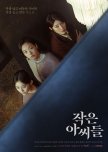
Mystical blue orchid juice; spit out.
The bigger the expectations, the bigger the disappointment. I was looking forward to this show for the cast and what seemed to be a complex, suspenseful story; it had a fresh vibe to it. Instead, the show fell flat from start to finish. The cardinal issue is the overwhelming lack of reality in virtually every character, their motivations, and plot lines. In fact, I wonder if they would have better succeeded by employing a more surreal tone/style or adding clearer fantasy elements. It's hard for me to digest a mystical blue orchid juice schema as realistic. It does look like a nice color for a cocktail, though.The three sisters' interrelationships were not compelling or authentic. They were never on the same page with anything, willfully ignoring one another's advice and support, even freely embarrassing one another publicly, and putting each other in danger. Are they really sisters? Oh In Hye and Park Hyo Rin looked like they could be sisters, but were not.
Even though Won Sang A is overall not believable as a character, I did enjoy her skilled execution of 'delightful perversion'. She deserved a better ending scene; it was lame. Kim Go Eun, who I've generally enjoyed in other shows, was regrettably dull as Oh In Joo. I even got a bad acting vibe from her in this show. Oh In Hye's character was worthy of hate, but I was still impressed at how the actress put out a convincing arrogance, immaturity; she almost felt like a good character that was placed incorrectly on the board. Oh In Kyung, on the other hand, was too narrow and stubborn to enjoy, I feel the acting/directing could have been interpreted in a less narrow way; she had the right look for the part, but the delivery was simply overcooked.
Music was fairly good. The opening track, Power Scandal, was the right vibe for the show. I picture weird lizards crawling around peoples face when I listened to this. It definitely enhanced the 'twisted' feeling of the plot and villain characters. The OST tracks were mostly dark in tone and served well to enhance the thriller tension and action. Listening to the OST tracks alone, they feel appropriate for nighttime city suspense.
I'd actually like to rate this show lower, but I can feel the strong effort of production, the effort to try to do something different, great, and compelling. The show always felt like it had that potential to be great and it wasn't so far from accomplishing that with some modifications. Although the cast and crew fell short of my expectations, I applaud them for trying to give us something fresh.
Was this review helpful to you?
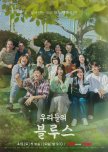
Smoldering hearts; soothing splashes
The stories of loosely related characters take place on the volcanic island of Jeju, far from the thrills and electric pace of the mainland. Jeju's a place where you can only run so far before reaching the shore to contemplate upon yourself; a place where flashing wealth is not in style; a place where the wealthy still haggle for the best fish prices (or so the setting has us believe). Through music, cinematography, and short stories, the show's ambience encourages us to examine the human heart with a magnifying glass. And that is what Our Blues does so well - invite us to look at the human condition intimately, intensely, and to the point we want to run away and cleanse ourselves of these heavy feelings. It's so intense, that I took several days' breaks from watching the show to seek out lighter fare. It's not all melancholic plot; there are many moments of humor and joy.The show isn't particularly plot driven, or even character driven; they're important but development is limited due to the omnibus-style narration. What the story does well is invite us to slow down and contemplate the universality of being human. Every human struggles with hardship, relational stress, and craves acceptance. The stories also remind us how much effort goes into living with self, with others. If we work on communication, work through difficult experiences, the potential to find permanent solutions, or at least respite from problems, is achievable. It's when we realize others are hurting and working to get through life that we may back away from hardened feelings, and find opportunities to heal, forgive, and re-connect.
I wouldn't listen to any of the soundtrack in my personal listening, but it was an effective accompaniment to the show. Many tracks evoked the wistful, playful vibe of an island. Perhaps a bit folky. Not a lot of virtuosic guitar solos at the end of the fretboard if you know what I mean. The natural scenery was impactful, soothing, and we see the sea in its many forms, both day and night. The lodgings, market places, and community spaces all looked authentic and humble.
It's difficult to comment succinctly on characters. Overall, a terrific ensemble. Several stories are not believable, but succeed in evoking emotional reflection. One of the scenes that captures the show's overall ambience is when Lee Dong Seok gets angry when his regular customers purchase products from another vendor. In mainland commerce, everyone knows that competition drives life. But here on the island, working together means survival. The haenyeos reinforce this for us as well - "We move together".
Don't feel you have to watch this show in one go. Take a deep dive (watch what you can handle), catch some pearls of wisdom, and return to the surface for air when you need. When you're ready for the next dive, go for it.
Was this review helpful to you?

